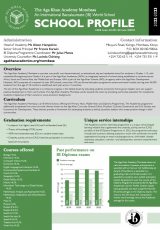The Aga Khan Academy Strands - A Workshop for Parents
On Friday 13th February 2015 we held a day-long AKA Strands Workshop for parents. It was well-attended by parents from across our PYP, MYP and DP programmes. A big ‘thank you’ to all those who attended for their insightful contributions during the workshop.
The Programme was delivered by both teachers and students and was designed to give parents greater knowledge and understanding of the AKA Strands and the ways in which they underpin our work across all phases. There are five Strands which are integrated into life at the Academy. Two strands focus on developing dispositions that will be necessary for ethical leadership:
- Pluralism promotes active engagement with people different from us with the purpose of working together for the common good.
- Ethics fosters the development of a strong moral compass and the habit of evaluating actions within an ethical framework.
The three complimentary strands develop knowledge and contextual understanding to underpin these dispositions, and prepare students to lead effectively in the developing world:
- Economics for Development focuses on the development of students’ understanding of global economics in a practical context, showing how economics can be used to improve the quality of people’s lives over time.
- Cultures creates understanding of our own culture and the cultures of others.
- Governance and Civil Society develops understanding of the nature of good governance, and our rights and responsibilities as members of a civil society.
The workshop began with an introduction to The Strands and the Academy Vision by Naheed Bardai, Principal of Senior School. This was followed by a presentation by Karishma Bhaghani, a DP2 student who spoke eloquently and comprehensively about the way in which her understanding of the Strands and her dispositions as an ethical and pluralistic leader have developed through experiences in the classroom and beyond.
The next stage saw us move across to the Global Politics classroom. The students led a taster lesson which explored feminism in politics and engaged them in a debate. This was a lively session and parents were very active participants; indeed, their participation provided many interesting and alternative perspectives for students which challenged their thinking.
Rukiya Cochu, the PYP Coordinator, presented an overview of the Strands in the Junior School. She then offered advice about how parents might use story books, reading ‘Something Else’ by Kathryn Cave and Chris Riddell which invites rich discussion about many aspects of Pluralism.
Daniel Orwa led the next session and taught a shortened version of a Math lesson which might be typically taught to Year 8 students which examined statistics through the Ethics lens and very clearly demonstrated the ways in which statistics can present very different messages.
We then enjoyed a working lunch with members of the Year 7 English group. Students talked about their experiences with the text ‘The Giver’ and with short stories. The students read passages from the texts which illustrated the types of discussions that they had related to Ethical Leadership and Cultures.
We ended with an interactive session which explored the ways in which we can encourage our children to view issues in the news using different ethical frameworks such as Utiltarianism (greatest good for the greatest number) or Virtue Ethics (what would a virtuous person do in this instance) so that they can see that there are many potential responses to the ethical dilemmas that we face in society.
We are grateful to parents for their many questions and comments which have given us insights into how we can take Strands learning forward at the Academy.
By Joanne Gogelescu





